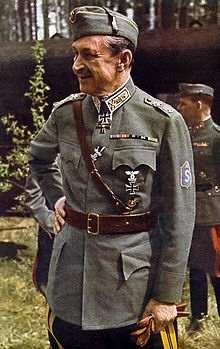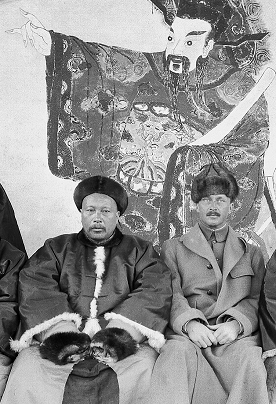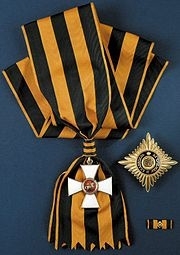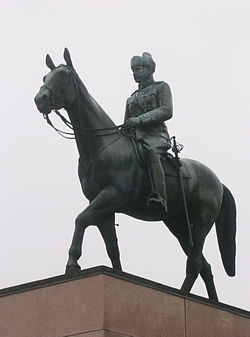 |
Karl
Gustaf Mannerheim of Finland was a great life in history. He was a military person,
but he possessed a warm heart and loved his nation. Mannerheim was a simple man
who had simple goals, which were reflected from his motto, "With pure arms
on behalf of pure goals" (Mannerheim), meaning that he would only fight
for a good cause. General Karl Gustaf Mannerheim, the marshal of Finland, led
Finnish troops through the fight for independence of his homeland in World War
2. The values he lived by were determination and devotion towards anything that
mattered to him. Mannerheim was also a compassionate philanthropist who founded
the Mannerheim Child Welfare League which is still in operation. Karl Gustaf
Emil Mannerheim, a Swedish descendant was born in to a Finnish family in 1867.
Due to money problems of his family during his early years, he had serious
discipline problems in school (Karl). Mannerheim was sent to a Finnish cadet-school
to learn self-discipline, but he had already adapted a determined and willful
way of thinking during his early years. During the time of the military school
Mannerheim became interested in military careers, and soon found himself
attending a prestigious Nicholas Cavalry school in Russia from where he
graduated in 3 years (Stults). He served in the Russian army in the
Russo-Japanese war distinctively and took on a task to travel and map China as
a secret intelligence officer from 1906 to 1908 (Stults). He fought in the First
World War in the Russian uniform and led a cavalry brigade on the
Austro-Hungarian and Romanian battlefronts (Stults). Mannerheim was awarded
with the greatest military decoration of the Russian Federation the "Order
of St. George" in 1914 (Karl). In 1917, Mannerheim returned back to
Finland in 1918 and led the anti-communist troops in the civil war of Finland.
He then became the commander-in-chief of the Finnish defense forces (Stults).
During the interwar period Mannerheim focused on humanitarian causes, heading
the Finnish Red-Cross and founding the Mannerheim child welfare league in 1920
(Mannerheim). During the 1920's and the 1930's Mannerheim returned to Asia
where he hunted and travelled. In 1939, when the peace negotiations with the
Soviet Union failed, Mannerheim took on the job of commanding the Finnish
Defense forces at the age of 72. Finland fought the Soviet Union in many
separate wars from 1939 to 1944 with the help of Nazi-Germany, which provided
supplies to Finland (Karl). After the war in 1944, he enjoyed a brief
presidency and moved to Switzerland for his retirement years, where he died in
1951 (Mannerheim).
 |
| Mannerheim in China |
Determination
and Devotion were values that Mannerheim demonstrated through his actions in
his life and are characteristic traits that a hero like him possesses. During
his life, Karl Gustaf Mannerheim developed a determined and devoted character
that drove him to great accomplishments in his life. Mannerheim's perseverance
and ambition were the controlling forces through his life. "As a youth,
Mannerheim decided on a military career, but he had already developed the
streak of willfulness that would be prominent in his mature character."
(Karl). He was very confident about his career choice from early on, which underlines
his determined attitude. His willfulness would be the factor that would guide
his later life. Although Mannerheim had unstable ties to Finland on an
emotional level, he was devoted to return to his homeland during World War 2
and fight for the freedom of the nation. "Carl Gustaf Mannerheim's
ambivalence toward his Finnish homeland in the first five decades of his life
makes his later determination to serve his homeland during very difficult times
even more remarkable and commendable." (Stults). Mannerheim's decision to
serve his troubled homeland during and after World War 2 points out his
devotion towards a subject that somehow mattered to him. His decision to serve
Finland in World War 2 greatly changed the outcome of the winter war against
the Soviet Union. Karl Gustaf Mannerheim
is a man to admire not only because of his values such as determination and
devotion toward anything that that mattered to him, but also because of his
achievements in the military career.
 |
| Order of St. George |
Mannerheim
was not only an adventurer, a brilliant military mastermind, and a man of
principle. He was also a warmhearted man who put other people and his nation
ahead of himself. Karl Gustaf with the help of his sister Sophie conceived the
idea about a child welfare program in Finland that would improve the health of
the nation's children." He gained a positive reputation for his civic and
humanitarian efforts, which included the formation of a child welfare program
(1920) using his name and financial support and his becoming the chair of the
Finnish Red Cross"(Stults). Like many other pioneers before him, he
reached beyond himself to help the nation's children to survive the problems
that came with the wartime showing his compassionate side. His humanitarian
actions underline how he was a man of many qualities and took care of the ones
that he felt responsible of. As the Winter War progressed and the Soviet Union came
within the range of releasing artillery fire upon major Finnish cities,
Mannerheim thought about the best of his country and negotiated a peace treaty
with Stalin (Stults). "Stalin was eventually able to draw up his massive
artillery against Mannerheim. Pragmatic by nature, Mannerheim decided that
Finland had no choice but to negotiate a 1940 peace treaty" (Karl).
Although the nature of the event was masked, Mannerheim had demonstrated his
wise way of acting under pressure by negotiating a peace treaty instead of
letting the enemy kill his people like other military leaders had done during
the war. His way of thinking about the best of his people makes him a great man
in history that possessed characteristics of a true father of a nation.
 |
| Statue of Mannerheim in Helsinki, Finland |
Mannerheim
was not only a soldier and highly demanding military commander, he was a
politician, and an adventurer who supported humanitarian causes - And in
addition he possessed one quality that is common to all great men, a tremendous
will-power that lead him through his desperate times. His way of considering
his nation and loved ones as the top priority during the wartime distinguishes
him from the other leaders of his time. Mannerheim's admirable life values and
his heroic acts inside and outside of his country, makes him a hero in the eyes
of his nation. The time of heroes is not over, and the legacy of Karl Gustaf
Mannerheim will live forever in the hearts of the people he once loved. His
ambition, perseverance and humanitarian acts make him a person of great
admiration. Karl Gustaf Mannerheim truly was, and still is a hero whom we all
can learn an important lesson from.
Work Cited
Karl Gustaf
Mannerheim." Historic World Leaders. Gale, 1994. Gale
Biography In Context.
Web. 9 May 2012.
Mannerheim, Carl Gustaf Emil von." World Book Student. World Book, 2012. Web. 9 May 2012.
Mannerheim Museo." Mannerheim Museo. Mannerheim Museum. Web. 09 May 2012.
Stults, Taylor, and Stults Taylor. "Carl Gustaf Mannerheim." Great
Lives From History: The Twentieth Century (2008): 1. Biography Reference
Center. Web. 2 May 2012.
Page created on 7/1/2012 12:00:00 AM
Last edited 7/1/2012 12:00:00 AM
